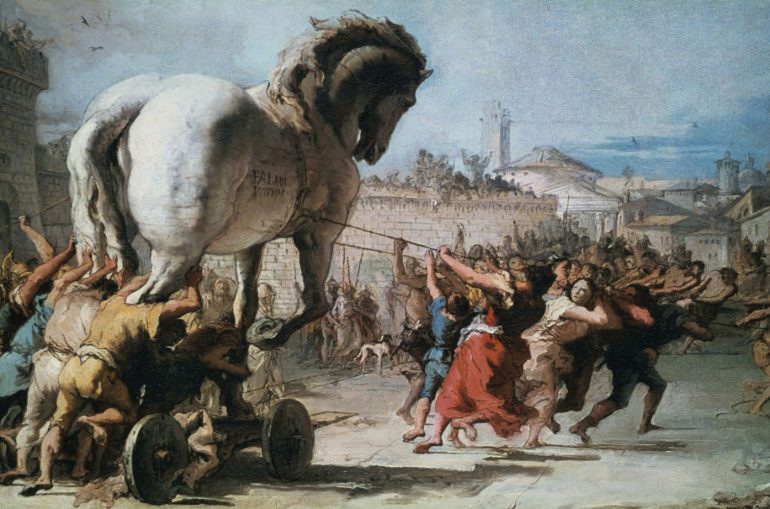The Trojan War: Fact or Fiction?

By A Noise Within
July 29, 2021
There is little historical documentation of the ancient Greek Bronze Age, and The Iliad and The Odyssey provide some of the only written records of a Trojan War between the people of Troy and an Achaean army occurring. Because Homer’s epics provide some of the only records of the war, there is still much dispute as to the validity of historical knowledge coming from these epics.
First considering archaeological evidence for the existence of the Trojan War, it is commonly accepted that the city of Troy was destroyed in war around 1200 BCE. Troy was allegedly found using The Iliad as reference; however, it is unknown exactly why the city fell. Homer’s epics suggest that it was destroyed by the Greek army in the Trojan War, but there is little to no other evidence to support or refute this.
The specific depictions of battle in The Iliad are also cause for disagreement among scholars. While the descriptions of armor and of battle strategies are consistent with other findings from ancient Greece, they are inconsistent to a singular time. The evolutionary nature of the oral storytelling tradition can explain these inconsistencies, but does it also invalidate any possible historical findings from the source?
In The Iliad, gods are depicted as humans, fighting on the battlefield of the Trojan War, divided in their allegiance. Some argue that the Trojan War likely did not take place because of these supernatural elements, but this argument may perhaps overlook certain interpretations or possibilities. The inclusion of Greek gods in the epics may be seen as political propaganda, bolstering Greek pride as city-states were on the rise. Alternatively, one sees that gods in Homeric epics lack magical elements present in the myths, including for example Achilles’ heel as his only weakness. The characters of the gods then appear as mortal, possibly a writing device to highlight themes of war.
While Greeks of the Classical period believed The Iliad to be a factual account of history, today, there is no apparent scholarly consensus on whether or not the Trojan War took place, nor to what degree Homer’s work reflected an actual time in Greek history. Ultimately, we must remember that Homer’s epics are works of art and appreciate them as such.
Learn more about our upcoming live production of An Iliad.
Edited from: “Ancient Greece.” Munitions of the Mind: A History of Propaganda, by Philip M. Taylor, Manchester University Press, Manchester; New York, 2003, pp. 25–34. JSTOR, www.jstor.org/stable/j.ctt155jd69.7. Accessed 15 Apr. 2020.
Irene J. F. de Jong. “Convention versus Realism in the Homeric Epics.” Mnemosyne, vol. 58, no. 1, 2005, pp. 1–22. JSTOR, www. jstor.org/stable/4433613. Accessed 15 Apr. 2020.
M. I. Finley, et al. “The Trojan War.” The Journal of Hellenic Studies, vol. 84, 1964, pp. 1–20. JSTOR, www.jstor.org/stable/627688. Accessed 15 Apr. 2020.








